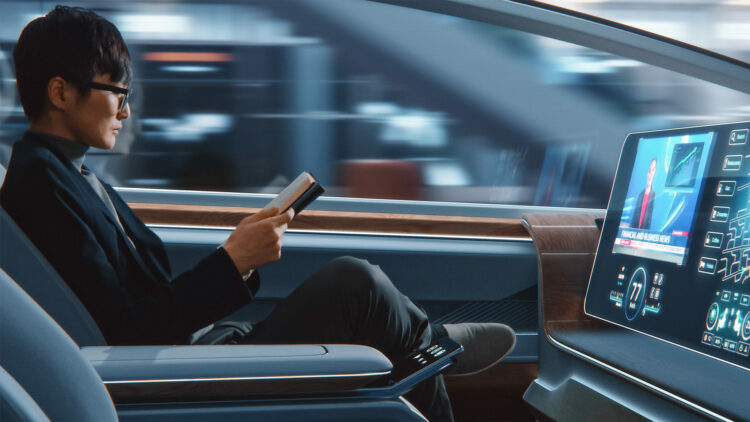Volkswagen Group Sees Growth in Sales Revenue and Commercial Vehicles, but Software Division Faces Setbacks
Volkswagen Group has reported positive news in terms of sales revenue, order books, and the production of commercial vehicles. However, the company’s software division has experienced significant challenges, leading to job cuts and a need for a new approach.
In the first quarter, Volkswagen Group saw a 42% increase in sales of battery electric vehicles (BEVs), which now make up around 7% of the company’s total deliveries. Sales revenue also increased by 22% to €76 billion, driven by increased sales volumes in North America and Europe.
Despite these positive results, operating profit fell from €8.3 billion to €5.7 billion year-on-year due to negative non-cash effects and disruptions in supply chains. The company’s net liquidity in the automotive business also decreased to €38.4 billion due to the IPO of Porsche AG.
The Group’s BEV strategy has led to a 42% year-on-year increase in BEV deliveries, with 141,000 vehicles delivered in the first quarter. The company is continuously improving its powertrain and battery technology and has produced over half a million battery packs from its plant in the Czech Republic.
Traton, Volkswagen’s commercial vehicle unit, reported a 25% increase in unit sales and a 31% increase in sales revenues. The unit has already begun its transition to electrification.
However, the positive news about the company’s sales and commercial vehicles is overshadowed by the challenges faced by Cariad, Volkswagen’s software group. The division has encountered significant issues, leading to the firing of its entire executive board, except for one person. These issues have also resulted in a delay of up to four years in the launch of the company’s new software, originally intended to enable Level 4 autonomous driving by 2026.
Despite these setbacks, Volkswagen’s battery production remains a highlight. The company’s MEB vehicles use battery systems produced in the Czech Republic, with production capacity set to increase with the opening of a second plant in 2023. The company is also expanding its battery business in North America and plans to double the number of charging points by 2026.
The replacement of software CEO Dirk Hilgenberg with Peter Bosch highlights the importance of software and AI in the future of electric vehicles. However, catching up to global leaders like Tesla, who have a four-year headstart in AI development, will be a significant challenge for Volkswagen.
Overall, Volkswagen Group’s financial results are positive, but the setbacks in the software division highlight the importance of addressing software and AI issues to ensure the success of the company’s electric vehicle strategy.
Title: Autonomous Vehicles Delayed by 4 Years as VW Resets Software Programme
Introduction
German automobile giant Volkswagen (VW) has announced a significant setback in its autonomous vehicle development, citing a need to reset its software programme. This setback will result in a delay of approximately four years in the release of VW’s autonomous vehicles. The decision reflects the intricate challenges involved in achieving safe and practical self-driving technology while underlining the company’s commitment to ensuring the highest standards and safety measures are met.
Background
VW, a leader in the automotive industry renowned for its innovative technologies, originally embarked on its autonomous driving project with the aim of introducing self-driving vehicles into the market by the end of 2025. However, after encountering technical hurdles and realizing the magnitude of the task at hand, the company has made the difficult but necessary decision to reset its software programme.
Reasons for Delay
The complexity of developing autonomous vehicles that can operate flawlessly in diverse scenarios such as heavy traffic, adverse weather conditions, and unexpected road hazards has proven to be a formidable challenge. VW’s management acknowledged that it had underestimated the intricacy involved in achieving the desired level of safety and reliability.
Additionally, the company has been transparent about prioritizing adherence to stringent safety regulations above aggressive timelines. VW understands the gravity of launching autonomous vehicles that meet the necessary safety standards and gain public trust. This commitment to thoroughness and compliance with regulatory requirements has resulted in the decision to prolong the development process.
Resetting the Software Programme
Resetting the software programme used in the development of autonomous vehicles requires significant effort and investment. It involves a complete overhaul of the existing system, extensive recalibration, and meticulous testing to ensure that the technology performs optimally across various real-world scenarios. VW’s decision to undertake such a comprehensive reset is a testament to its commitment to delivering a safe and reliable autonomous driving experience to its customers.
Impact on VW’s Future
While the setback will undoubtedly have an impact on VW’s financial resources and competitive advantage, the company remains focused on long-term success. Prioritizing safety and reliability ensures that VW will not compromise its reputation and brand integrity, which have been cultivated over decades. The delay reflects the company’s dedication to developing a game-changing technology that can truly revolutionize the automotive industry, even if it means deferring its market entry by several years.
Conclusion
Volkswagen’s announcement of a four-year delay in its autonomous vehicle programme due to the resetting of its software programme is significant news in the realm of self-driving technology. The acknowledgement by a leading automotive manufacturer that the complexities and challenges faced in developing safe and reliable autonomous vehicles are greater than initially anticipated underscores the magnitude of the task at hand. VW’s decision to prioritize adherence to safety standards above accelerated timelines is commendable and reiterates the company’s commitment to delivering an exceptional driving experience to its customers. While the delay is disappointing, it is essential in ensuring the final product is worth the wait and paves the way for a safer and more efficient future of transportation.

